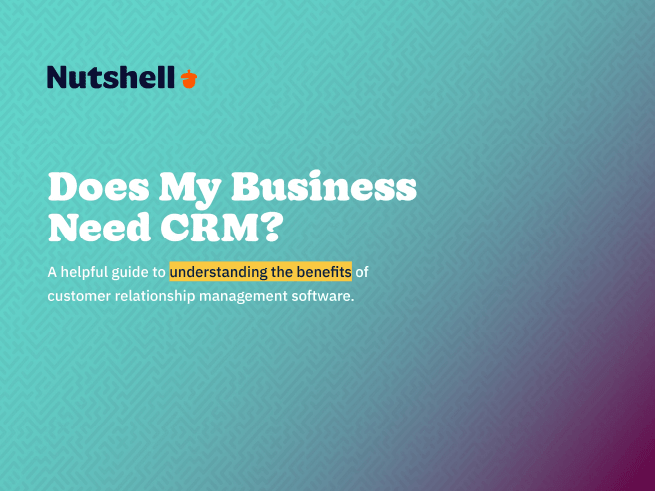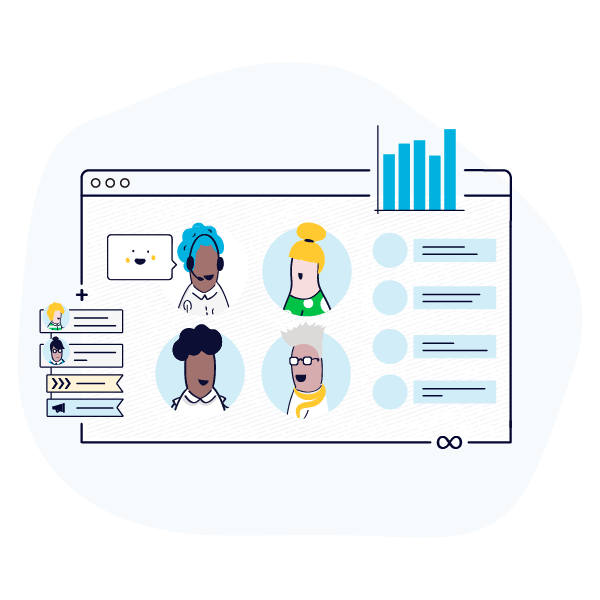
Collecting crucial customer data is at the heart of business success and growth. That’s why every business should have a CRM database to gather the required data.
For your company to drive revenue, you need to make sales—that’s Business 101. But not every company realizes that the key to sales is knowing your audience. By becoming familiar with the people you sell to, you’ll be able to market to them much more effectively.
The question is, how do you get to know your audience better? Easy—by analyzing customer data. Your customer data can tell you a ton about your audience. But with that data spread out across a hundred different sources, it can be hard to analyze.
A CRM database is the centralized repository at the heart of a CRM system, where a company stores and organizes all of its customer-related information, including contact details, interaction histories, and purchase data. By consolidating this information, it provides a single, accessible source of truth that allows sales, marketing, and service teams to have a complete and unified view of every customer. This organized data is crucial for personalizing communication, improving customer relationships, and making strategic, data-driven decisions.
That’s where CRM database software comes in. With a CRM database, you can learn far more about your audience. But what is a CRM database? Keep reading to find out!
A CRM database is a platform designed to let you store all your customer data in one place. It stands for “customer relationship management database” and allows you to easily view, organize, and analyze your customer data.
Now that you’ve learned what is a CRM database system, the way it works is that it integrates with all the third-party platforms where you generate customer data, and it then imports that data into the database. Within the database, you can then organize that data however you choose.
Also, it’s worth pointing out that CRM database software rarely stands alone. Usually, they’re part of an overall CRM platform that also includes other tools and features for analyzing and acting on the data you gather—the database itself is just one piece of the puzzle.
There are a few different benefits to using a customer relationship management database. Still, the biggest one is that—as we suggested earlier—it helps you learn more about your audience.
As you gather data about your customers, you can spend time analyzing it to learn who buys from you and what they want. That, in turn, helps you market to them more effectively, driving more sales overall.
Another major benefit simply comes down to convenience. You certainly could attempt to analyze your customer data from its original source, but the thing is, your data is likely spread across several different tools. A CRM database gathers all that data into one place, making it far easier to locate and analyze.
With these core CRM database benefits, you can look forward to the following residual advantages:

There are a few different types of CRM databases out there. Those types mainly differ in how and where the data is stored.
Here are the three main types available.
On-site databases, also called on-premise databases, are stored directly on your company’s servers—hence the name. These tend to be very expensive and complex, and more often than not, large enterprises go for them. They usually require a whole team of specialists to maintain.
Like on-site databases, you store open-source databases on your company’s servers. However, they’re usually far less expensive—many of them are even free.
Of course, the drawback is that they tend to take a lot of work. There’s no team provided to help you manage open-source databases—you have to do it all yourself. That includes handling things like data security.
Finally, you have cloud-based databases. In today’s world, most of the big-name CRMs are cloud-based. You wouldn’t store these databases on your servers—they’re kept in the cloud, as the name suggests.
The advantage of cloud-based databases is that you can access them from anywhere, not just your business premises since they’re stored online. These databases are usually sold by well-known companies that provide customer support, making them easier to manage.
As we mentioned earlier, CRM databases rarely stand totally on their own. Most CRMs contain additional tools and features on top of the database, enabling you to do more with your customer data than just store it. Here are a few features you can expect to find in most CRMs.
One thing you can use CRMs for is communicating with your leads and customers. Many CRMs will let you run email and SMS marketing right from the platform, not to mention setting up phone calls and meetings.
Of course, you could do that in another tool, but the convenient thing about doing it in a CRM is that you can base it on the data you’re already pulling in. Your CRM is already tracking when leads hit certain checkpoints, so why not go ahead and rig it to send out emails at those checkpoints, too?

Building off the last point, CRMs often come equipped with sales automation capabilities. We just mentioned email marketing, and that’s one area you can automate—your CRM can send out emails automatically rather than you having to do it manually each time.
On top of that, your CRM can automate the data collection process, automatically pulling in data from different sources. That’s far easier than manually copying everything from each platform.

Finally, the best CRMs come with data analytics features. After all, the entire point of gathering all that customer data is to learn from it. The last thing you want is a CRM that gathers all that data and then lets it sit there unused.
Most CRMs will allow you to generate, at the very least, basic sales reports so you can see trends across your customers. More advanced CRMs will also let you generate custom reports on different metrics and groups of customers.
A good CRM database design should give you access to loads of features that increase your productivity and help your business grow. That said, these are the main features you’ll want to look out for:
Nutshell has what you’re looking for.

There are several steps to creating a CRM database, each requiring some consideration.
Once you’ve determined how you want to use your CRM database, you can choose a structure that aligns with the way you intend to store and use data to engage with customers.
The three primary CRM system categories include:
Ideally, you want a CRM database like Nutshell that offers all of the above.
Think about the data you need to improve your processes and meet your goals. Typically, teams aim to collect the following fundamental data:
Next, you should clarify where you plan to collect data and how you’ll gather the information. There are a few key sources to consider, including:
You have numerous CRM database systems to choose from, each of which brings different strengths and weaknesses to the table. When selecting your ideal provider, consider the following:
While determining the best CRM database system for your organization is vital, it’s just as important to plan how you’ll upload your existing batch of data. For some companies, this could be a significant amount of data gathered via more primitive means before investing in a proper CRM database.
Needless to say, this data entry process could take some time and may require additional human resources to execute. Make sure you have a workable plan in place to have your system up and ready to collect and analyze data when needed.
Once up and running, you’ll need to formulate a CRM database management plan to ensure regular data collection and analysis.
Looking to find a customer database for your company but need help figuring out where to start? Look no further—Nutshell is the ideal email marketing CRM.
Nutshell has everything you could want in a CRM. On top of our expansive CRM database, we offer all the features listed above—lead communication, sales automation, and data analytics—and we make it incredibly easy for you to sort your leads and customers in our platform.
On top of that, we offer top-of-the-line customer service. Don’t believe us? Just check out our 14-day free trial to see what Nutshell can do for your business!
Most small businesses can get Nutshell up and running in just 1-2 weeks. Basic setup takes a few hours, data migration typically requires 2-5 days, and team training adds another 3-5 days. Complex implementations with extensive customization may take up to a month.
CRM databases range from free to
$150+ per user monthly. Nutshell starts at just $13 per user per month (annual plan), offering unlimited contacts, storage, and live support. Most small businesses spend $25-$50 per user monthly for comprehensive features.
While Excel works for very small operations, it lacks automation, real-time collaboration, and scalability. As you grow beyond 50 customers, Excel becomes inefficient with duplicate data, lost follow-ups, and security risks that dedicated CRMs like Nutshell prevent.
Nutshell partners with Import2 for seamless migration from 30+ CRMs. The process includes automatic data mapping, sample migration for verification, and full import with support. Most migrations complete within 2-5 days, preserving your complete sales history.
Yes, reputable cloud CRMs like Nutshell use bank-level security. We employ 256-bit encryption, store data on secure AWS servers, maintain GDPR compliance, and conduct regular security audits. Your data is actually safer than on local servers.
Give our powerful, easy-to-use CRM a try for free for 14 days! Or join a live demo to see Nutshell at work!



Join 30,000+ other sales and marketing professionals. Subscribe to our Sell to Win newsletter!
